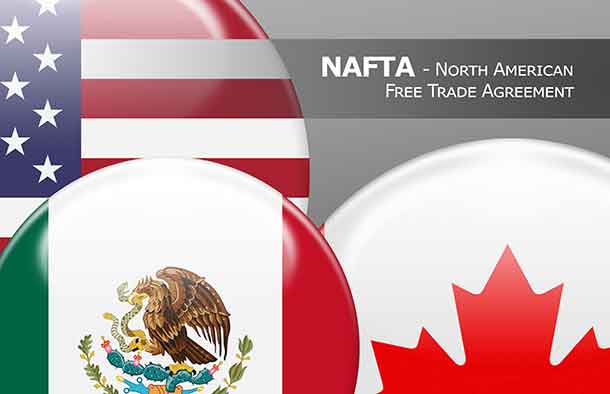While NAFTA 2.0 is stalled in the American Congress, the impacts of the new trade pact are already starting to impact small businesses across Canada. This is especially true in the agricultural sector where new rules could see Canadian farmers losing access to larger markets south of the border. The new agreement named the United States-Mexico-Canada Agreement (USCMA) is viewed by pundits as a massive win for the U.S. President Donald Trump as he campaigned on a pledge to rejigger America’s trade relationships.
The intense negotiations which resulted in the USCMA have left many Canadians wondering if their government lost an opportunity to expand the reach for many of its small businesses.
While new contribution and cost requirements are a net positive for Canada’s auto industry, some question whether the requirements are so complex that most automakers will opt for the standard 2.5 percent tariff under WTO rules.
If this is to happen, then it is possible that the benefits of the new agreement could be lost, and this could have a knock-on effect for small businesses in communities that rely on the auto industry.
Beyond this, there are also questions about the impact on other industries of importance for Canada such as mining, oil and gas, and timber. Regarding the latter, the new agreement will do little to end a longstanding dispute between Canada and the U.S.
Ultimately, these unknowns could impact investment and hiring in small communities across the country. This could stop large businesses from growing, which in turn would take money out of local communities.
Beyond these issues, businesses are also dealing with several headwinds on the national and international levels. According to a recent report from Deloitte, this is because the Canadian economy is highly susceptible to shocks from political and trade risks.
Also, pressure from rising costs is impacting businesses. For example, shipping costs are set to increase this year as FedEx announced an average rate increase of 4.9 percent for 2020. Even with the promise of lower tariffs for some good, the increased costs will widely impact businesses as many goods sold in the country are shipped via air cargo.
Beyond these issues, one massive takeaway from the new trade agreement is the concession by the Americans not to impost tariffs based on national security concerns. This was a big worry of Canadian negotiators following threats by the American President to do so.
Some observers pointed out that if the Americans had chosen to do this it could have pushed Canada into a recession, something which the government was keen to avert following years of low energy prices.
Another perceived win for Canadian negotiators was the agreement to keep NAFTA’s dispute resolution mechanism intact. This means that panels with industry experts will be used to help resolve trade disputes as opposed to the Trump administration’s proposal to use the U.S. Court of International Trade as the venue to dispute resolution. Beyond the venue, this would have forced disputes to be resolved under the U.S. – something which would not always be beneficial to Canadian companies.
However, the news is not all good for Canadian businesses and the USMCA is largely seen as favoring American dairy farmers over Canadian dairy farmers. This includes a provision which will force Canada to end a pricing scheme for imported milk, butter, and cheese among other products.
Part of the reason why this will hurt Canadian farmers is that the U.S. has a surplus of milk and other dairy products and as such was pushing for greater access to local markets. As such, local producers could be forced out of business, or at a minimum before forced to compete against lower-cost imports; though it is unclear if Ottawa will put in place a scheme to help effect producers.
While there is little doubt that NAFTA needed to be updated – after all it was negotiated in the 1980s. Many observers question whether the deal will help Canadian businesses to not only defend their home markets will being able to take advantage of opportunities for growth south of the border.
Granted, many of the same questions where asked when NAFTA was first enacted. However, the change in the rules of trade could take a few years for Canadian businesses to benefit. Coming at a time of economic uncertainty at home and abroad, the disruptions could further impact communities that have been fighting for years to keep from losing businesses and talent.
Will the USMCA benefit Canada? Only time will tell, but for Canadian businesses, they must acquaint themselves with the new deal and then brace for any impacts.







